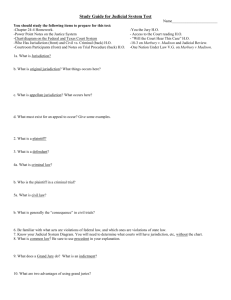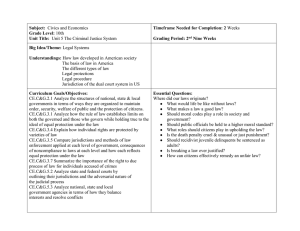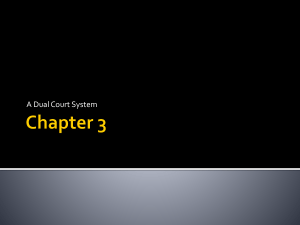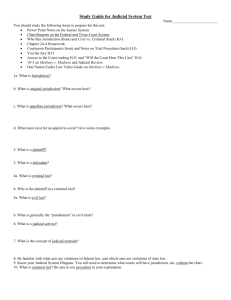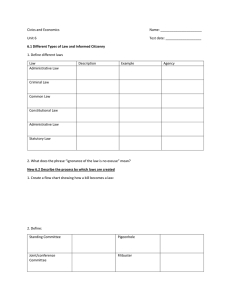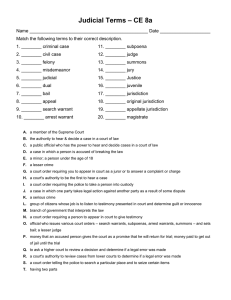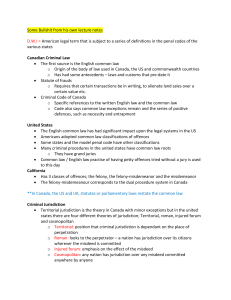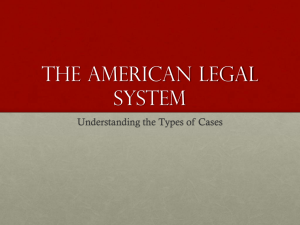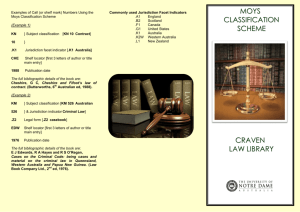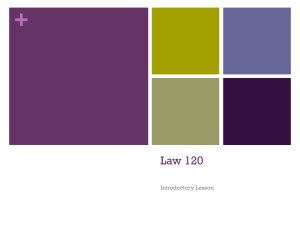Name: - cfhssocialstudies
advertisement
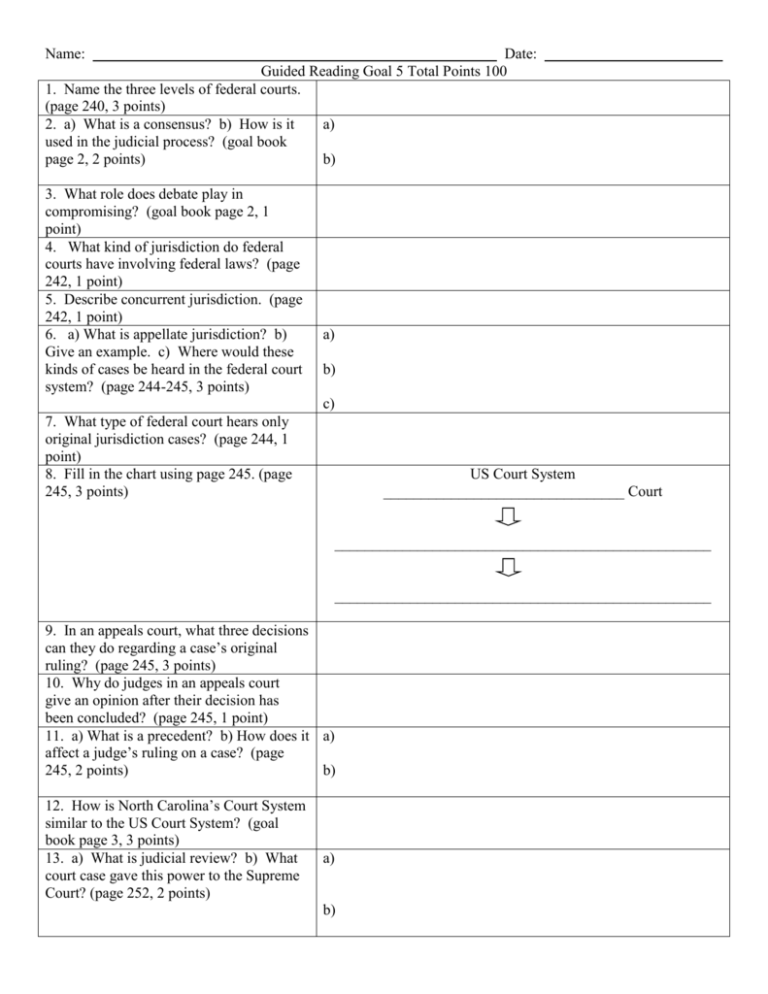
Name: Date: Guided Reading Goal 5 Total Points 100 1. Name the three levels of federal courts. (page 240, 3 points) 2. a) What is a consensus? b) How is it a) used in the judicial process? (goal book page 2, 2 points) b) 3. What role does debate play in compromising? (goal book page 2, 1 point) 4. What kind of jurisdiction do federal courts have involving federal laws? (page 242, 1 point) 5. Describe concurrent jurisdiction. (page 242, 1 point) 6. a) What is appellate jurisdiction? b) Give an example. c) Where would these kinds of cases be heard in the federal court system? (page 244-245, 3 points) a) b) c) 7. What type of federal court hears only original jurisdiction cases? (page 244, 1 point) 8. Fill in the chart using page 245. (page 245, 3 points) US Court System ________________________________ Court __________________________________________________ __________________________________________________ 9. In an appeals court, what three decisions can they do regarding a case’s original ruling? (page 245, 3 points) 10. Why do judges in an appeals court give an opinion after their decision has been concluded? (page 245, 1 point) 11. a) What is a precedent? b) How does it a) affect a judge’s ruling on a case? (page 245, 2 points) b) 12. How is North Carolina’s Court System similar to the US Court System? (goal book page 3, 3 points) 13. a) What is judicial review? b) What court case gave this power to the Supreme Court? (page 252, 2 points) a) b) 14. What is a court docket? (page 255, 1 point) 15. a) What does writ of certiorari mean? b) Why is it used? (page 256, 2 points) a) b) 16. Why do lawyers prepare briefs? (page 256, 1 point) 17. How are lawyers for each side of a case adversaries? (page 256, 1 point) 18. What is the purpose of a majority opinion? (page 256, 1 point) 19. Why would a justice write a concurring opinion? (page 256, 1 point) 20. What is a dissenting opinion? (page 256, 1 point) 21. a) What is a plaintiff? b) Who serves as the plaintiff in criminal cases? (page 431, 2 points) 22. What is a defendant? (page 431, 1 point) 23. a) What two categories are crimes divided into? b) Give 2 examples of felonies. c) Give 2 examples of misdemeanors. (page 432, 5 points) a) b) a) b) c) 24. What is larceny? Give an example. (page 432, 2 points) 25. What is the main difference between robbery and burglary? (page 432, 2 points) 26. What is the prosecution responsible for showing? (page 453, 1 point) 27. After an arrest has occurred, what is the next step in criminal cases? (page 457, 1 point) 28. a) What is a bail? b) Why would bail be set for some cases? (page 457, 2 points) 29. What does the grand jury decide in a criminal case? (page 457, 1 point) 30. What two possible scenarios could occur at the arraignment? (page 457, 2 points) 31. What are the pros and cons of making a plea bargain? (goal book/notes, 6 points) 32. After the conclusion of the trial, the judge or jury must reach ______ or _____. (page 457, 2 points) 33. Summarize in at least 5 sentences how a bill becomes a law. (20 points) 34. What is a conference committee? (page 201, 1 point) 35. a) What is a filibuster? b) What is a cloture? (page 200, 2 points) 36. After a bill passes Congress, what two choices does the President have? (page 202, 2 points) 37. What is a pocket veto? (page 202, 1 point) 38. What is zoning? (goal book page 9, 1 point) 39. Where do cities get the most money from? Explain why this leads to the controversial issue of annexation. (goal book/notes, 2 points) 40. How can people express their opinions to their local, state, or federal government? (goal book page 9, 3 points) 41. Give an example of a petition that you would like to see here at CFHS. (goal book page 9, 1 point) 42. What has to occur for your petition to be recognized by Mr. Spruill? (goal book page 9, 1 point) 43. What is the final step in the process of changing the law/rule at CFHS? (goal book page 9, 1 point) 44. How can lobbyist influence changes in the law? (page 335, 1 point) 45. Give at least 4 examples of special interest groups. (goal book page 9, 4 points)
